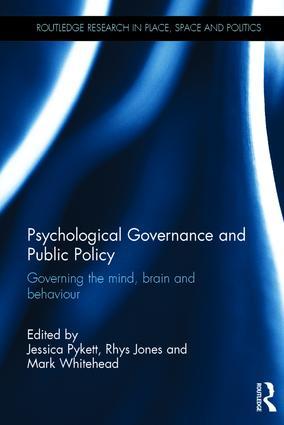
Zustellung: Do, 07.08. - Mi, 13.08.
Versand in 3-4 Wochen
VersandkostenfreiBestellen & in Filiale abholen:
This book provides a critical account of existing forms of psychological governance in relation to public policy. With contributions from leading scholars across the social sciences, chapters identify practical and political challenges posed by the current policy enthusiasm for particular branches of affective neuroscience, behavioural economics, positive psychology and happiness economics. The core focus is to investigate the ways in which 'psychological resilience' has become an ideal archetype for individual, community and national wellbeing.
Inhaltsverzeichnis
Contents
Acknowledgement
Notes on contributors
Acknowledgement
Notes on contributors
- Introduction: psychological governance and public policy.
Jessica Pykett, Rhys Jones and Mark Whitehead - The politics of silent citizenship: psychological government and the 'facts' of happiness
William Davies - Happiness as resource and resilience: an emotion for neoliberal times
Sam Binkley - Therapeutic governance of psycho-emotionally vulnerable citizens: new subjectivities, new experts and new dangers
Kathryn Ecclestone - Psychology as practical biopolitics
The Midlands Psychology Group: John Cromby, Bob Diamond, Paul Kelly, Paul Moloney, Penny Priest and Jan Soffe-Caswell - 'What about the children?' Re-engineering citizens of the future
Val Gillies and Rosalind Edwards - The imperative to shape young brains: mindfulness as a neuroeducational intervention
Alberto Sánchez-Allred and Suparna Choudhury
- Behavioural science, randomized evaluations and the transformation of public policy: the case of the UK government
Peter John
Produktdetails
Erscheinungsdatum
28. Oktober 2016
Sprache
englisch
Seitenanzahl
168
Herausgegeben von
Jessica Pykett, Rhys Jones, Mark Whitehead
Verlag/Hersteller
Produktart
gebunden
Gewicht
590 g
Größe (L/B/H)
234/163/23 mm
ISBN
9781138930735
Entdecken Sie mehr
Bewertungen
0 Bewertungen
Es wurden noch keine Bewertungen abgegeben. Schreiben Sie die erste Bewertung zu "Psychological Governance and Public Policy" und helfen Sie damit anderen bei der Kaufentscheidung.









